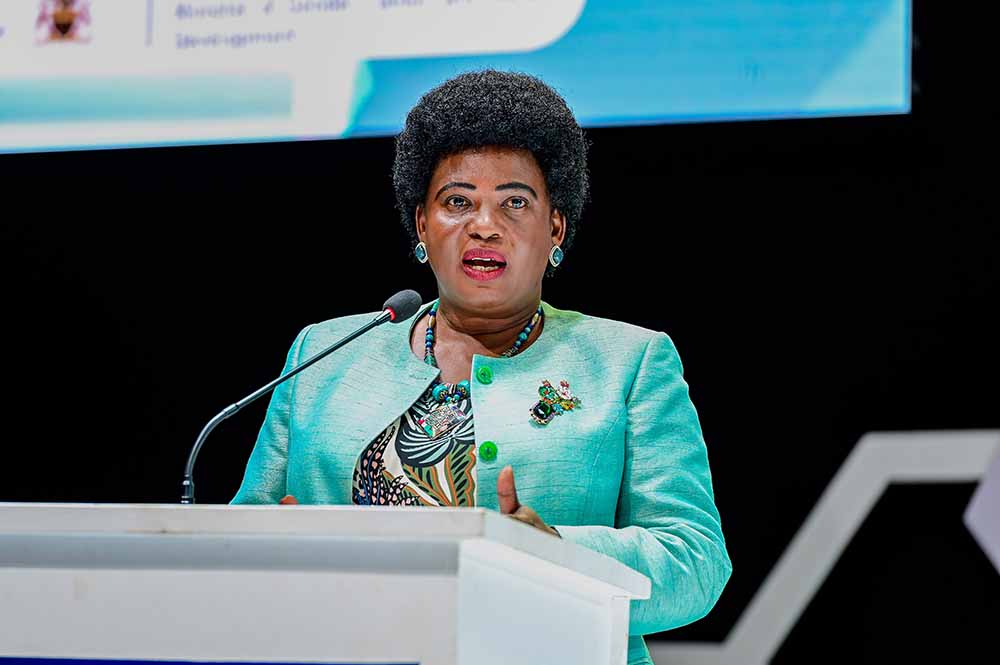Remittances is capital for businesses, says BOU
“Remittances are without exaggeration the unseen pillars upholding countless households and a vital force propelling our national development,” Atingi-Ego said.
Michael Atingi-Ego, the Governor, Bank of Uganda (center), Michael Mugabi (L), managing director at Housing Finance Bank, interact during the Eight Annual Bankers Conference. (Courtesy Photo)
KAMPALA - Remittances sent home by Ugandans working abroad are far more than just individual transfers, according to Michael Atingi-Ego, the Governor of the Bank of Uganda (BOU).
Speaking during the eighth Annual Bankers Conference organised by the Uganda Bankers Association (UBA) at Kampala Serena Hotel on July 29, Atingi-Ego said remittances are viewed not as charity or dependency, but as capital and investment that can propel families from poverty to prosperity.
“Remittances are without exaggeration the unseen pillars upholding countless households and a vital force propelling our national development,” he said.
“When we properly account for education spending as investment rather than consumption, we see that remittances already contribute substantially to both immediate welfare and long-term productive capacity. This demonstrates their immense potential to contribute even more directly to productive investment if effectively leveraged.”
Minister of Gender, Labour and Social Development Hon Betty Amongi Ongom delivers her remarks at the event.
In 2023, according to the BOU, remittances to Uganda reached a $1.4b, accounting for about 3% of Gross Domestic Product (GDP).
“These flows have consistently demonstrated remarkable resilience and growth, even amidst global pandemics and economic downturns. From $902m in 2015, remittances surged to $1.42b in 2019. While the Covid-19 pandemic caused a temporary dip to $1.1 b in 2020, they rebounded strongly since 2021, averaging $1.4b annually.
This sustained inflow stands as a testament to their stability, often surpassing other foreign exchange earners like coffee export revenue and tourism earnings, providing a steady stream of foreign currency even when other sectors faced headwinds,” Atingi-Ego said.
The core objectives of the conference were structured in four areas including: the Economic impact of remittances on growth and development, constraints and risks in the ecosystem, technology innovations shaping the future of payments, among others.

Shehryar Ali, Senior Vice President and Country Manager for East Africa at Mastercard.
“Globally, remittances often surpass foreign direct investment and official development assistance, underscoring their profound importance in addressing employment challenges, poverty alleviation, enhancing social welfare, exposure to other skills and economic support in migrant home countries,” Julius Kakeeto, chairman at UBA, said.
Minister of Gender, Labour and Social Development Hon Amongi Betty Ongom urged financial institutions to develop solutions that can enable diaspora workers invest more money back home.
“Can we have products that can link them to the housing system and land purchase because the majority of them want to buy land and come back and construct a home,” she said.

Julius Kakeeto, chairman at UBA
Shehryar Ali, Senior Vice President and Country Manager for East Africa at Mastercard said the cost of sending remittances across borders has been identified as a major issue.
He said that while the global average for digital transactions is around 5%, and cash transfers are even higher, this percentage significantly erodes the value of hard-earned money sent home by the diaspora.
“We are working towards the same goal with MTN, Airtel, DTB, and to really make it easy for every bank customer to not only receive money but also send money outside,” he said.